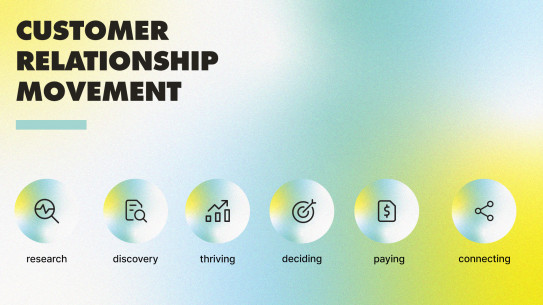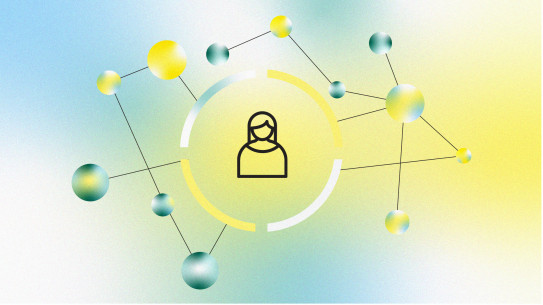
Leveraging customer data to drive customer value in B2B
The impact of digitalization is speeding up the pace of B2B relationships. Data presents a universe of opportunity to win in the buyer journey for B2B marketers who are prepared to embrace technology.
In the past, winning in the B2B sector meant hitting the right markets with the right offerings, or just being the cheapest producer. Close, personal client relationships influenced long-term success in advance. B2B customers, on the other hand, prefer digital tools to talking to an account manager, according to McKinsey. This implies that B2B marketers must adopt a new mindset. Forrester concludes in their B2B Loyalty, the B2C way report that B2B marketers are focusing too much on their products, internal processes and organization silos and not enough on the entire customer relationship. And that relation moves – just like in B2C – from research, via discovery, to thriving, deciding, paying, and connecting.

Room for development
The reality for most B2B businesses is far from this perception. Many businesses take days to complete an offer, need customers to fill out lengthy order forms, and keep customers in the dark about the status of their orders. Investing in client experiences pays off, according to study. In recent research, McKinsey discovered a 10 to 15% reduction in customer turnover, as well as a 40% increase in offer acceptance rates and a 50% reduction in marketing expenses. At the same time, staff happiness rises when the customer experience improves, as a stronger connection to clients gives their work more purpose. And in today's overheated employment market, happy employees are critical.
B2B enterprises in all industries – from manufacturing to services and high-tech – represent the customer's implicit ultimatum: make B2B shopping as simple as B2C, or we'll find someone who will. The explanation is straightforward: people desire more convenience. As a result, B2B and B2C are becoming increasingly similar. This means that firms like Coolbue and bol.com aren't the only ones who can benefit from a data-driven, customer-centric marketing strategy. Customer data must also be used by company to business to create effective end-to-end buyer experiences. But how can you do it in a clever way?

The devil is in the data
To keep up with customer expectations, B2B marketers are beginning to recognize they have little choice but to adopt technology. Customer acquisition, data management, and marketing automation are the top three business concerns for B2B marketers. These criteria can be viewed as different aspects of a single strategy: assisting customers throughout their whole customer journey. One of SQLI's food and beverage clients was dealing with a data problem. The international A-brand corporation failed to reduce client attrition. Customers were more loyal when they had a consistent, omnichannel brand experience. For a long time, marketing automation had been their solution for consistently providing relevant information to customers. One crucial component, however, was missing: end-to-end customisation. They were unable to obtain insight into how a consumer becomes a loyal customer due to a lack of a consolidated platform for customer data.
They could feel their competitors drawing closer as they struggled to get their customer data in place. Other industry players have succeeded in launching real-time, personalized omnichannel marketing to improve consumer relationships. The coffee firm chose to invest in a Client Data Platform (CDP) that would allow them to generate personalized customer profiles. This enabled them to determine which kind of material, promotions, and personal messaging resulted in increased retention. Significantly improving the customer experience was content regarding the brands' sustainability efforts.
Best practices for the best buyer experience
Using customer data to better the customer journey from start to finish resulted in significant competitive advantages for B2B, ranging from the discovery of new opportunities to increased customer retention. Some considerations for improving the B2B client journey include:
This is true for any optimization, but it is more important in something as personal as customer experience.
This strategy is frequently overlooked in B2B, with the assumption that it is only appropriate for B2C. Web traffic, leads, and revenue from high-performing campaigns, on the other hand, help B2B companies get to know their consumers and collect enough data.
Account-based marketing is a hyper-personalized sales technique that involves collaboration across multiple divisions inside your firm. Major stakeholders within a target firm are identified by your marketing, sales, and customer success managers. They then contact them in a very specific and targeted manner.
Marketing automation allows you to increase customer service while simultaneously lowering marketing costs. For instance, automate e-mail responses by informing customers when they may expect a customised response, or automate a Q&A to anticipate client inquiries. Marketers can use marketing automation to give the right information to potential customers at the right time during the buying process. This makes it one of the most powerful B2B marketing tools available, as well as a perfect place to start for data-driven marketers looking to personalize the buyer journey. If you want to keep driving digital growth in B2B by improving customer experience but aren't sure where to begin.


